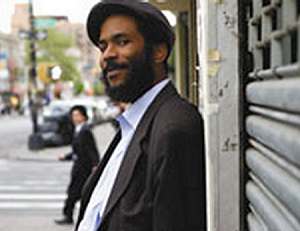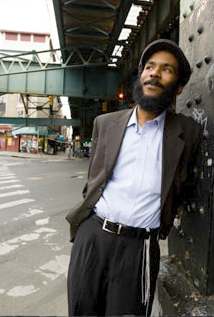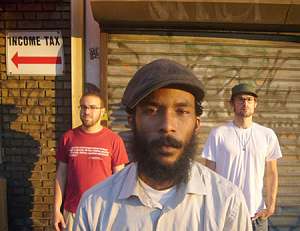Meet Yitz Jordon, a mocha-skinned, Hasidic rapper also known as Y-Love. He’s a convert to Jewish Orthodoxy who spits faith-based rhymes in a mixture of English and Aramaic, the ancient language of the Talmud and Kabbalah. It’s a style more rare than a canary diamond.
Y-Love’s journey from the gritty streets of Baltimore to a Brooklyn yeshiva, and his musical evolution from punk rock to hip hop has put him next in line among Jewish artists with mainstream potential, according to The Youth Intelligence Group, which monitors youth marketing trends.
Y-Love, the son of a Puerto Rican mother and Ethiopian-American father, grew up in Baltimore. He gravitated to the Jewish faith at the age of seven, telling his mother he wanted to celebrate Passover after he saw a TV commercial for the Jewish festival.
His mom arranged for him to attend a Jewish coworker’s Passover Seder. They gave him a Yarmulke, and by the age of 14 he wore it daily together with other Jewish religious articles.
As he got older he began to observe other items of the Orthodox Jewish way of life, celebrating Chanukah, fasting on Yom Kippur and wearing Tzitzis. He soon discovered that he was not fully Jewish unless he converted. His bible became “The Path of the Righteous Gentile,” a book describing the role of the Gentile in the Jewish faith.
“That book was my Shulchon Oruch (Code of Jewish Law),” he said. “It was my life. It was my religion.”
 After dropping out of college, though, his life began to take him away from Judaism. Though he worked a nine-to-five job as a computer programmer, he spent his weekends and afternoons running with a crowd of punk rockers who sought trouble. One day he was with a pair of friends who planned to rob a building, he said. As his friends crawled inside, Y-Love, waiting outside, had a religious epiphany. It was Rosh Hashanah, the Jewish New Year, and instead of celebrating in the synagogue he was helping to break a commandment.
After dropping out of college, though, his life began to take him away from Judaism. Though he worked a nine-to-five job as a computer programmer, he spent his weekends and afternoons running with a crowd of punk rockers who sought trouble. One day he was with a pair of friends who planned to rob a building, he said. As his friends crawled inside, Y-Love, waiting outside, had a religious epiphany. It was Rosh Hashanah, the Jewish New Year, and instead of celebrating in the synagogue he was helping to break a commandment.
“I had hit spiritual rock bottom,” he said. “’You call yourself Jewish?’ I thought. ‘You say you’re down with the Torah? Why don’t you see what the Torah has to say?’
The moment pushed him to visit a series of Jewish Web sites. He realized that at the bottom of each were the words “Brooklyn, N.Y.” He decided to visit. What he found, he said, was like a Jewish amusement park.
“They sold books in Hebrew,” Y-love said. “Everyone spoke Yiddish. Everyone wore Yarmulkes. It was incredible.”
Y-Love felt a connection in Brooklyn that he felt nowhere else, he said, so he decided to move there and convert to Judaism. Over the course of 13 months, he did his conversion at the Conversion to Judaism Resource Center in Brooklyn. Afterwards, the rabbis in charge of his conversion insisted he go to a Yeshiva in Jerusalem to integrate the Torah into his life. Of all places, it was in the Yeshiva, while studying the ancient texts, that he discovered hip-hop.
Everyone in Yeshiva is assigned a partner (a Chavrusa) to learn with. Y-Love was paired with David Singer, a Long Island resident who had been listening to hip-hop his entire life. To help study the Talmud, the two would turn the esoteric text into rhymes as a mnemonic to remember the complex Aramaic text. As Singer drummed on the table, Y-Love, sitting opposite him, would read the Talmud to the rhythm. During lunch break, they would freestyle their own rhymes.
“He had no idea what he was doing,” Singer said, “but I could tell his voice was platinum. I saw some ability but he really wasn’t good yet at all.”
 Y-Love had just begun to rap. By the time he had finished his studies in Israel a year later, though, he had improved his rhyming skills. When he and Singer returned to New York in the fall of 2001, they went to a Manhattan bar for open-mic night. On an impulse, the two took the stage in front of more than 50 people and freestyled for more then half-an-hour.
Y-Love had just begun to rap. By the time he had finished his studies in Israel a year later, though, he had improved his rhyming skills. When he and Singer returned to New York in the fall of 2001, they went to a Manhattan bar for open-mic night. On an impulse, the two took the stage in front of more than 50 people and freestyled for more then half-an-hour.
“We destroyed it,” Singer said. “It was a crazy freestyle session back and forth.”
Afterwards, the manager of the bar approached them and asked them to perform regularly. Over the next few years, the pair developed a reputation as talented Jewish rappers. Two years ago, they opened a show for Matisyahu. By that time, Y-love had come into his own.
“He was a superman with rhymes,” Singer said. “He went from nowhere to really good within a year and then he went from there to really, really good like he is now. I definitely give him props.”
Today, Y-love spits faith-based rhymes in a mixture of English, Hebrew, Aramaic and Yiddish, the languages of the Talmud, Kabala and Judaism in the diaspora. He’s also studying Greek, Latin and Arabic, which he already is sprinkling throughout his lyrics. He hopes to use his music to promote the Jewish faith as a vehicle to improve lives.
“God wants us to elevate ourselves,” Y-Love said. “If someone’s asking you to come up to the penthouse, why do you insist on staying in the basement? I’ve lost family to drug abuse. I’ve lost friends to stupidity. This world will kill you if you don’t raise yourself up.”
“I want to see an army of Haredi (religious) artists coming strong,” he said. “I want to see Yarmulkes sold on the Home Shopping Network. I want to see Judaism blowing up.”
